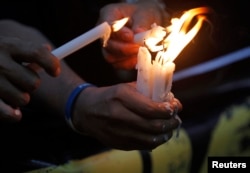Six years after nearly five dozen people were gunned down in the southern Philippines in the country’s worst case of election-related violence, no convictions have yet been made. One of the main suspects has died and one of his sons, who is also accused, has posted bail and is running for political office.
Little has changed in the political climate since at least 57 people were killed in Maguindanao province in the southern island of Mindanao, said officials with the National Union of Journalists of the Philippines. Of the dead, at least half were media workers.
"Political patronage, warlord-ism, private armies, electoral violence, electoral dishonesty – these are all still present," said Alwyn Alburo, the union’s vice chairman. "And even the corruption of our colleagues in the media, these are all meant to just further that status quo of those who are in power."
Union officials said that with 196 suspects but no convictions, resolution to the case is looking "bleak." But they said they would continue to highlight injustices raised by the incident and advocate for the victims’ families.
Ambush sets stage
On November 23, 2009, more than 100 armed men ambushed a convoy of journalists and supporters of a candidate for Maguindanao governor. The media convoy was there to cover the candidacy of now two-term Governor Esmael Mangudadatu, who had sent his wife and sisters to submit papers for his candidacy.
The victims were "shot on a mountainside and buried en masse with a government-owned backhoe," the Committee to Protect Journalists recalled in a blog post last July.
The committee cited subsequent attacks on journalists and said "impunity in media killings across the country" has created "a chilling effect on the work of journalists."
Members of a rival clan whose control of the province had been cemented for about two decades have been charged. Andal Ampatuan Jr. is accused of leading the group that carried out the killings; his father, three brothers and a brother-in-law also have been charged with plotting the attack.
The family members have maintained their innocence and have petitioned for bail, mostly unsuccessfully.
Commitment to justice questioned
Family patriarch Andal Ampatuan Sr. died in July because of multiple health problems. One son, Sajid Islam Ampatuan, posted bail earlier this year and is running for mayor of Shariff Aguak, Maguindanao’s capital.
Alburo blames President Benigno Aquino for a "lack of political will" in the case, which many say is being delayed because of the defense.
Aquino’s press secretary, Edwin Lacierda, called the accusation "unfair" and said the case was in the hands of the courts.
"Make no mistake, we are very concerned also. We would certainly like to have the trial of the Ampatuan case hastened, as well," he said, adding the administration hoped for a decision before Aquino’s term ends in July. "But is it something within our control? That’s not within our control."
The Supreme Court has allowed a "first in, first out" rule to expedite the process. Instead of trying every one of the 196 suspects – with only 110 brought in – decisions on the key suspects will be handed down first.
Manila-based political analyst Ramon Casiple said the case is "straightforward" and does not require answers to complex legal questions. He said he "remains optimistic" because the principal accused parties are detained and their appeals for bail are being challenged.
But Casiple said the main obstacle to justice is time, because a typical case can take 10 years.





